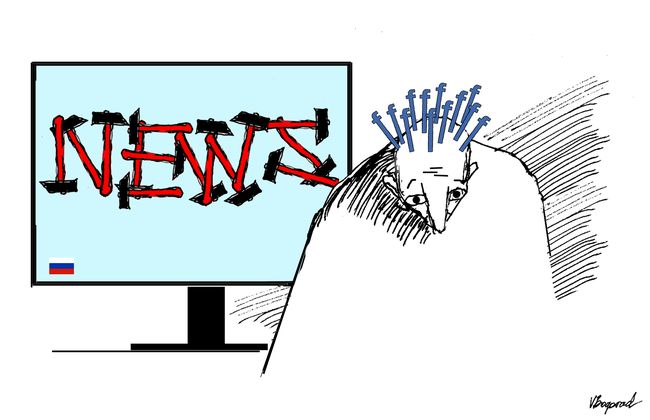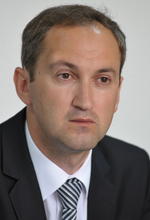UK Foreign Secretary announced the government’s plans to allocate 700 million pounds to set up an empowerment fund which is to be used as a “soft” weapon against Vladimir Putin. According to British The Telegraph, some of the abovementioned amount will be directed to projects of combating Russian propaganda in Ukraine and the Baltic States. Overall, the foreign aid budget, intended to support the UK’s allies abroad, will amount to 12 billion pounds this year.
According to the newspaper, the British foreign aid will not be spent on weapons but instead will combat extremism in the Middle East, particularly cyber warfare.
The publication also notes that it was Johnson who initiated setting up of a new empowerment fund, also labeled the anti-Putin soft power fund. In December past year, he said in particular: “We have the cult of the strong man. We have democracy in retreat. We need to redouble our resolve and defend and preserve the best of the rules based on international order.”
Citing a Whitehall source, The Telegraph writes that the fund is seen as a way to help boost the UK’s global influence in the wake of Brexit.
A Foreign Office’s spokeswoman commented on her superior’s initiative thus, when asked by Daily Mail: “The Empowerment Fund is in the early stages of development. Details of the Fund will be announced in Parliament in due course.”
The UK is beginning to take concrete steps in the fight against Russian propaganda. And the sooner the aforementioned fund starts working, the better.
Let us recall that late past year, the US imposed additional sanctions on Russia over cyber attacks launched during the presidential campaign. In Italy, officials also voiced suspicions that it was Russia that organized non-stop hacker attacks against the Italian Foreign Ministry past year.

Sketch by Viktor BOGORAD
And very recently, the chief campaign manager for the French presidential candidate Emmanuel Macron said there had been “hundreds or even thousands” of attempts to hack computer systems of his staff, which could be traced to Russia.
Citing German government sources including the Interior Ministry, security services and the Federal Chancellor’s Office, Frankfurter Allgemeine Zeitung says that the Kremlin will try to massively influence elections in Germany through cyber attacks and a campaign of misinformation.
Leading Western countries are beginning to realize the danger of Russian propaganda and finally starting to take countermeasures.
The Day asked British and Ukrainian experts to comment on the initiative of the UK foreign secretary.
COMMENTARIES
Edward LUCAS, senior vice president of the Center for European Policy Analysis, London:
“This is too little and too late. We don’t need money to stop Putin. We need willpower. So long as the City of London is laundering the Kremlin’s money, nobody will take British statements seriously. We need to prosecute the bankers, lawyers, and accountants who are the accomplices in the looting of Russia and end the climate of impunity which destroys our moral standing in the world.”
Serhii SOLODKYI, deputy director of the Institute of World Policy, Kyiv:
 “The UK has extensive experience in communications work, so this news is nothing special. The past years saw significant communications support from that country received by Ukraine as well (in the form of advice and training), and as far as I know, we are still receiving it. The UK was just as active in supporting this country’s European integration before the Russian aggression, and the British paid considerable attention precisely to communications, effectively public education work. So I see no extraordinary surprises here, as Britain has always understood the importance of information work, the weight of words. What does make a positive impression, is the fact that this area of foreign policy still gets support from Johnson, who, to speak frankly, earlier joined Russia’s hybrid war efforts to an extent. For instance, he has repeatedly accused the EU of being supposedly responsible for the conflict in Ukraine, and in this way he, without realizing it and apparently unwillingly, played up to the Kremlin’s information directives. Therefore, allocating significant UK funds to combating hybrid threats and information provocations can be seen as a kind of corrective to the previous course. Johnson seems to have realized the extent of damage that can be caused by propaganda. In fact, even back during his visit to Ukraine in September past year, it was clear that Johnson was aware of the level of threats emanating from Russia,. including the danger of Russian propaganda.
“The UK has extensive experience in communications work, so this news is nothing special. The past years saw significant communications support from that country received by Ukraine as well (in the form of advice and training), and as far as I know, we are still receiving it. The UK was just as active in supporting this country’s European integration before the Russian aggression, and the British paid considerable attention precisely to communications, effectively public education work. So I see no extraordinary surprises here, as Britain has always understood the importance of information work, the weight of words. What does make a positive impression, is the fact that this area of foreign policy still gets support from Johnson, who, to speak frankly, earlier joined Russia’s hybrid war efforts to an extent. For instance, he has repeatedly accused the EU of being supposedly responsible for the conflict in Ukraine, and in this way he, without realizing it and apparently unwillingly, played up to the Kremlin’s information directives. Therefore, allocating significant UK funds to combating hybrid threats and information provocations can be seen as a kind of corrective to the previous course. Johnson seems to have realized the extent of damage that can be caused by propaganda. In fact, even back during his visit to Ukraine in September past year, it was clear that Johnson was aware of the level of threats emanating from Russia,. including the danger of Russian propaganda.
“Ukrainian and British visions may differ on the perception of the EU, but our approaches are very close on the need to severely punish the Kremlin for violations of international law including its aggression against Ukraine. I would say that for this reason, the British and personally Johnson are not just partners, but friends of Ukraine. In this context, the UK’s exit from the EU may even be beneficial to Ukraine, since after it is completed, the Whitehall will have no need to adapt its response to Russian provocations to that of other European countries that show a higher degree of naivety in their policies towards the Kremlin. Meanwhile, dependence of Russian oligarchs, including members of Putin’s inner circle, on British banks and property holdings is common knowledge. Therefore, severe unilateral sanctions imposed by Britain may become a more serious blow to the Kremlin than moderate restrictive measures passed by the entire EU.”
***
Clearly, propaganda should be fought with knowledge. And Den has been doing just so for over 20 years, with its efforts including publication of books on historical subjects, so that the world better understands the processes unfolding in this country and Ukraine’s bilateral relations with our neighbors. Many of them have been translated at the expense of the newspaper into English, like Ukraine Incognita. TOP 25 and A Case without a Statute of Limitations; or into Polish, like Wars and Peace. Accordingly, the Ukrainian government could have been promoting such finished products abroad which would help it fight Russian propaganda and improve the image of our country there. It could have, but has not...









